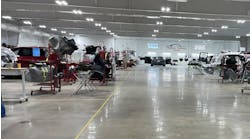WDs, jobbers fear loss of bids to retailer could spread to other states.
For at least the last 20 years, All Parts Distributors in Linden, N.J., bid against other local jobbers and WDs for state agency automotive parts contracts.
But earlier this year, All Parts Distributors and other automotive parts contract holders found out they were not going to be able to bid on the contracts they held that expired this year. They had been awarded to AutoZone.The state recently signed a purchasing agreement for automotive parts for its fleet of vehicles with the U.S. Communities Government Purchasing Alliance. AutoZone was named as the supplier in the contract, commencing April 15, 2008, for three years.
Phone calls to the state's purchasing department requesting to speak with someone regarding the issue were not returned.
In the meantime, Ron Brody of All Parts Distributors in Linden, N.J., says he is concerned about what this will mean for the aftermarket.
"Government is getting bigger and big business is getting bigger," he says. "And that leaves the small businesses, the entrepreneur, in a place where things are not good for them at this point."
In the past, Brody says All Parts Distributors, which was an approved bidder having met certain criteria and being based in New Jersey, would receive a request for proposal from the state. His company then would go over the list of specific parts for the state's fleet of vehicles, each being precise in brand and other specifications.
"Out of 170 specified lines, we probably got 50 or 60 of them for at least our part of the state," Brody explains. "They required also in that process that we have certain specified delivery times. If it was one of the major state agencies and if they called before 10 a.m., we had to get the parts to them by 3 p.m. If they called after 10 a.m., it was by 10 a.m. the next day."
A copy of the AutoZone contract provided to Aftermarket Business shows a three-day required delivery time and no specific parts named, like brand name brakes, spark plugs or other components.
"We would bid against other entities who are like us, our competitors," Brody says. "If the state determined we were the best for that particular bid (we would receive it). It was quite an involved process in terms of the amount of energy we had to put into it. The guaranteed pricing had to be firm for a minimum of a year, so we couldn't put in price increases, anything. We had to stick with the pricing that was in the contract."
In a letter to Republican Sen. Thomas H. Kean Jr., and in which Assemblymen Eric Munoz and Jon M. Bramnick explain the contract, was provided to Aftermarket Business, and states the New Jersey legislature authorized the state treasury department in 2006 to join nationally recognized purchasing cooperatives for goods and services.
The contract was competitively bid in Mecklenburg, Va., while previous bids were awarded to New Jersey-based businesses. But the letter cites AutoZone's "significant New Jersey presence, currently employing approximately 1,200 people in 60-plus stores, including larger 'hub' stores (mini warehouses)." AutoZone, according to the April 28 letter, also is offering New Jersey businesses to sign up as AutoZone distributors; 20 former contractors had done so as of April 28.
The letter also states that an extensive investigation and price comparison were conducted before the contract was awarded. But what has Brody and his fellow New Jersey jobbers and WDs uneasy is that they have not received answers to how much the state will save by going with AutoZone on the contracts, which are for three years.
"The point is, the bids were not transparent," he says. "Show us the information that proves to us that you're going to save money for the state by doing it this way. We've yet to see that information."
According to a State of New Jersey news release announcing the AutoZone agreement, the contract will save the state between $1.5 million and $2 million in fiscal year 2009.
But Brody says this agreement could be picked up in other states, meaning other independent jobbers and WDs could lose some of their business.
"For us, it's about 6 percent of our business, in the neighborhood of $1 million a year," he states. "But just extrapolate it. It's probably 2 (percent) or 3 percent of the whole entire aftermarket. If it goes to one supplier, you tell me what it means...give anyone an inside track the whole enchilada, and there's a heck of a reason to start lobbying."



